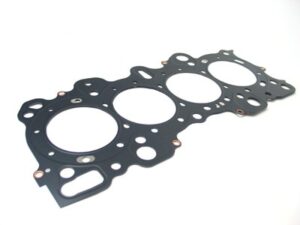 A head gasket is used to seal the combustion chamber by filling the gap between the engine block and the cylinder head. Consisting of composites surrounding a thin metal layer, the head gasket is flattened to size when the cylinder head is torqued into place. Typically a one-time use type of component, some special solid copper or aluminum head gaskets crafted from material in dead soft hardness are capable of multi-use applications. Used without any further sealing compound, this type of high-performance head gasket is capable of effectively sealing the combustion chamber as well as the water passages against any leaks.
A head gasket is used to seal the combustion chamber by filling the gap between the engine block and the cylinder head. Consisting of composites surrounding a thin metal layer, the head gasket is flattened to size when the cylinder head is torqued into place. Typically a one-time use type of component, some special solid copper or aluminum head gaskets crafted from material in dead soft hardness are capable of multi-use applications. Used without any further sealing compound, this type of high-performance head gasket is capable of effectively sealing the combustion chamber as well as the water passages against any leaks.
Some head gasket types utilize a graphite compound on the outer surface of the gasket. This graphite material acts as a sealant and ensures no leaks develop over time. As the engine comes up to normal operating temperature, the graphite bonds with the head and block surfaces to create a permanent bond and seal. When disassembled, this graphite is often very difficult to remove and typically requires a razor blade or a sturdy putty knife to scrape it clean. Most engine manufacturers recommend a small dab of silicone sealant be applied to the corners of the head gasket as well as around the coolant ports to provide an extra measure of protection against leakage.








